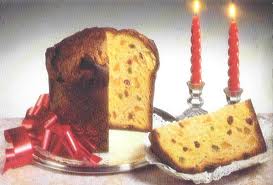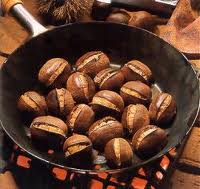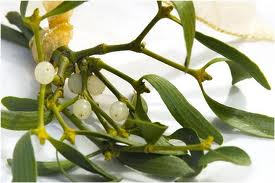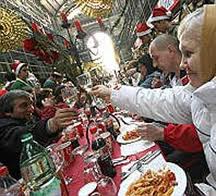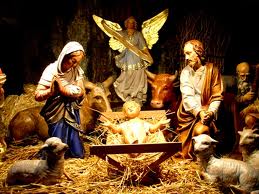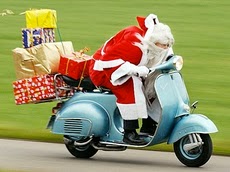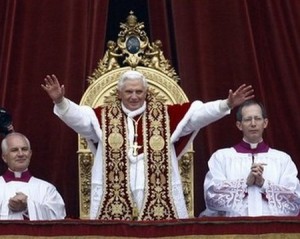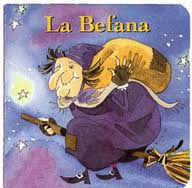.
Some of my favorite things about the Italian Christmas holiday season are — not surprisingly — edible. Starting with le castagne, il panettone, and le lenticchie, following is a list of a few of my favorite Italian Christmas holiday things followed by explanations, some local lore, and info on current practices.
.
Read & Practice Your Pronunciation
.
.
- Le castagne, le caldarroste = Chestnuts, roasted chestnuts (also called ‘castagne arrostite’).
- Il panettone = Typical Christmas cake from Milan.
- Le lenticchie = Lentils.
- Il cenone = Big dinner, from the word cena (dinner) plus the suffix -one, indicating ‘large’.
- Il Vischio = mistletoe.
- L’albero di natale = Christmas tree.
- Gli addobbi = Decorations.
- Le luci = Lights.
- Le palline = Ornaments (literally, little balls).
- Babbo Natale = Santa Claus or Father Christmas; babbo = dad or daddy, Natale = Christmas.
- I regali = Presents.
- Gesù Bambino = Baby Jesus.
- Il Presepe, il presepio = Manger, nativity scene.
- La vigilia di Natale = Christmas Eve.
- Chiesa = Church.
- Santa messa = Holy mass.
- Buon Natale! = The greeting/wish equivalent to Merry Christmas!
- Buone Feste! = The greeting/wish equivalent to Happy Holidays!
- Auguri di stagione! = The greeting/wish equivalent to Seasons Greetings!
- Capo d’Anno = New Year’s Eve, literally the ‘head of the year’.
- Prospero e felice anno nuovo! = A prosperous and Happy New Year!
- L’Epifania = Epiphany, Jan 6th.
- I Tre magi = The three wise men.
- La Befana = Gift-bringing witch (on Epiphany).
- La Calza = Stocking.
.
.
Le castagne. In Italy chestnuts are a symbol of winter. They are used in breads and cakes and roasted and eaten plain. There’s nothing better than buying castange arrostite (roasted chestnuts) from a street vendor in a paper cone and eating them while strolling through the centro storico (downtown) of Milano, or any Italian city (more on the holiday period in Milano here).
.
Il panettone. Large golden-colored dome-shaped Christmas cake made from flour, butter, eggs and sugar, with candied citron and sultanas (small seedless raisins). Light and fluffy, NOT heavy like a fruit cake; panettone originated in Milano and is now eaten all over Italy. No Christmas table in Italy is complete without it. I love the smell of this special cake. Luckily it is widely available in specialty food shops in the U.S., including Trader Joes and Cost Plus World Markets.
.
.
Le lenticchie, Capo d’anno. Lentils are little round flat legumes, often used in soup or stew. Popular Italian tradition has it that since the lentil shape resembles a coin, eating it on New Year’s Eve or Day guarantees good health and prosperity all year long. It is common in Italy to eat dishes containing lenticchie on Capo d’anno (New Year’s Eve). Sometime between Christmas and New Year’s Eve, I promise I’ll post my recipe for Italian Lentil Stew 🙂
.
.
Il Vischio. During the Holiday Season it is an old tradition to give vischio, or mistletoe, especially on the last day of the year. It is often dipped in gold or silver paint, and it is given as a symbol of good wishes, or ‘auguri’. One of my friends in Milan reported that, “a large bank in the downtown has hung a huge ‘vischio’ outside the bank and they invite whoever wants to stand under it, and have their picture taken while kissing under the mistletoe.” Now that’s a fun publicity stunt!
.
.
Il cenone. In Italy, celebrating Christmas in family is very important and consists most importantly of eating, eating, and eating! As one friend said, the eating/celebrating starts the 24th and continues on thru the 26th/27th, only to start up again on Capo d’Anno (New Year’s Eve). The most common day of the big family dinner depends on location: in Rome and further south it’s a huge dinner on the evening of Christmas Eve, based on fish, especially eel. In northern Italy, families tend to celebrate on Christmas day with a midday dinner based on some type of roast meat. While many claim that southerners are bigger ‘mangioni’ than northerners, it seems to me like both do some pretty serious face-stuffing (abbuffare)!
.
.
L’albero di natale, gli Addobbi, le luci, e le palline, il presepe. As a rule, people in Italy do not go overboard decorating their homes for the holidays. Many will have a nativity scene, and perhaps a Christmas tree, but it will usually be small-ish, possibly a live tree still in the pot, and not super-loaded with ornaments. And some of the tree decorations might consist of chocolates, candies, and small fruits (that after the holidays, the kids get to eat!). In the downtown areas of cities and towns there will be lights and other decorations along the street. Larger cities will be especially lit up, and some have begun using LED lights because they are energy-saving and less polluting.
.
.
Babbo Natale, i regali, Gesù Bambino, e la Vigilia di Natale. In most households it is Babbo Natale (Santa Claus) who brings the regali (presents) and leaves them under the albero di natale (Christmas tree). In some more religious families it is Gesù Bambino who brings the regali and leaves them near the presepe (manger), though this version is diminishing, especially as kids become ever more clever! In both cases, the presents are delivered the on night of la Vigila di Natale (Christmas Eve) and the bambini run to check for the regali on the morning of Natale.
.
.
Chiesa, Santa messa. In smaller towns and the in the south, more people go to chiesa (church) for the santa messa di Natale (holy Chrismas mass) than in bigger cities. Though like in the US, those who don’t go to church every Sunday will often go on the occasion of Christmas. The most popular service is midnight mass on Christmas Eve, but many also go Christmas morning.
.
.
I Tre magi, l’Epifania, la Befana, and le calze. The Italian holiday season lasts until l’Epifania (Epiphany) on Jan 6th, when the three wise men arrived in Bethlehem. This is also when la Befana makes her entrance. Befana is a beloved, gift-bearing witch who arrives the night before the 6th on a broom filling le calze (stockings) of bambini bravi (good kids) with gifts (mostly candy and fruit) or, for i bambini cattivi, (naughty kids) coal! The Befana truly is a legend and merits a whole blog post to herself. Stay tuned!
.
Mando a tutti i migliori auguri di buone feste con le vostre famiglie e gli amici!
(I send everyone best wishes for happy holidays with your family and frends!)
.
… And if have any questions or favorite Italian Christmas holiday things please share them in the comments section below! (Under the sign-up form) I love to hear from you! 🙂

